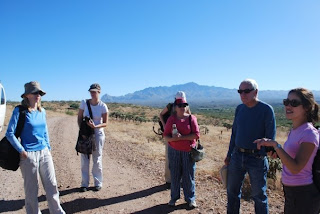By Bill Jordan,
(originally posted at Off the Wall Perspectives, a blog from volunteers at No More Deaths)
Made it back to DC late last night & want to post something today, while the experience is still fresh in my mind & in my heart.
How do you sum up the week in Nogales, how can you put into words an experience like we had?
On Thursday night Brenda asked us what we would take back with us, & for me it's the stories that I heard.
I had been to the border once before, with Borderlinks, in October, 2009, & sad to say I learned this week that the insanity of our immigration policies continues unabated, & perhaps even worse than before.
I heard so many stories of men & women who had lived a significant number of years in the US, who were stopped by police for something petty, or were caught up in a raid by ICE, & then deported, leaving behind husbands, wives, parents, & children, with very little chance of ever returning to the US, except for trying another border crossing, with all of the dangers of the desert.
There was a woman, 7 months pregnant, from Oaxaca, who had lived 10 years in Florida & had 2 kids who are US citizens. She went back to Mexico with her kids in June, 2010, to see her family, but her kids haven't been allowed to enroll in school in Mexico, because they don't read Spanish. She spent a day & a half in the desert, hoping to return to FL, so that she could arrange to bring her kids back to US, but then was found by the Border Patrol. She was waiting in Nogales for bus fare to return to Oaxaca.
Another young man with bad blisters on the bottom of his feet had lived for more than 10 years in California. He went to Mexico for his father's funeral, then tried to return to his family in CA, but was caught.
Another man lived for 20 years in Arizona, with 3 kids (all US citizens). He went to pick up his daughter from her job & while waiting his youngest child started skateboarding in the parking lot. A local policeman came to stop this, then somehow with no justification whatsoever, questioned the father about his citizenship status, result, father deported, family broken apart.
The stories went on like this all week. There were also many stories from first-time crossers, who simply wanted a chance at a better life, & were caught in the desert. Some were determined to try again. I think if people in the US could hear these stories & meet some of the people I met, they would be able to see that these are our neighbors, not "aliens" & not threats to our "way of life." I want to bear witness to the stories that I heard, so that maybe the anti-immigrant sentiment so rampant in our country can start to change, & hearts can be broken open, to welcome the newcomers.
All week long & today I have been overcome by waves of sadness as I remember the stories I heard & the people I met. I expect these waves of sadness will continue for a while. In many ways I hope they will, because they keep me connected to those I met. I wonder what will become of them, in 1 year, 5 years, 10 years. I doubt that I will ever know.
But I do know that they don't need my pity. There was great strength & resilience in those I met. Actually, I feel sorry for us, as Americans, that we don't get it, that we are refusing to change insane & broken policies, in the name of national security, or protecting our way of life, or whatever.
We are diminished as a nation when we treat migrants inhumanely. In the mural at the Comedor Jesus breaks bread with the migrants, men, women, & children, & breaks down the borders & barriers that separate us. May we do the same in our home communities.
 Almost every single young person I came across is currently in school or trying to find a way to enroll in school if their parents cannot provide the necessary resources. The biggest problem I saw was that most students that reach the age of 18 or older and "age out" of school have no way of continuing their education because it is extremely expensive. That is a very poor message for these kids to be taught. "Go to school, invest money in your education instead of learning a trade or just quitting at a young age and getting a menial job and then when you reach the age of being eligible to enter college (20+), their won't be any other options for you unless you have the money that it takes to attend".
Almost every single young person I came across is currently in school or trying to find a way to enroll in school if their parents cannot provide the necessary resources. The biggest problem I saw was that most students that reach the age of 18 or older and "age out" of school have no way of continuing their education because it is extremely expensive. That is a very poor message for these kids to be taught. "Go to school, invest money in your education instead of learning a trade or just quitting at a young age and getting a menial job and then when you reach the age of being eligible to enter college (20+), their won't be any other options for you unless you have the money that it takes to attend".


































